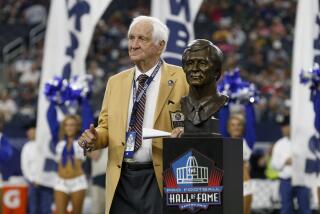Peter Gent dies at 69; ex-wide receiver wrote ‘North Dallas Forty’
- Share via
Peter Gent, who turned his vivid memories of a five-year career as a wide receiver with the Dallas Cowboys into the blisteringly candid bestselling novel “North Dallas Forty,” has died. He was 69.
Gent, a standout basketball player at Michigan State University in the early 1960s, died Friday at his home in Bangor, Mich., of complications from pulmonary disease, according to the D.L. Miller Funeral Home in Bangor.
Despite being drafted by the old Baltimore Bullets of the NBA, Gent chose football over basketball after college. Signed as a free agent by the Dallas Cowboys, he played flanker from 1964 through 1968. At age 27, his NFL career was over. But he wasn’t done with football.
In 1973 Gent published his first novel, “North Dallas Forty,” which exposed a side of professional football few fans had seen before, as Jim Bouton’s “Ball Four” had done for baseball three years earlier. Players experienced excruciating pain that endured long after the game’s final whistle; they blew off steam afterward in raucous parties fueled by drugs, alcohol and sex; and management ruthlessly treated athletes as commodities, mere equipment to be used as long as possible and then discarded when they wore out.
While the book’s narrative might have been fresh — eight days in the life of a pro football player — the characters were familiar. The narrator, Phil Elliott, is a maverick wide receiver for the North Dallas Bulls, stand-ins for the Dallas Cowboys. Elliott’s buddy Seth Maxwell appears to be modeled on good-time Cowboys quarterback Don Meredith. The steely coach, B.A. Strothers, is strikingly reminiscent of legendary Dallas coach Tom Landry. Readers had no problem connecting the dots.
By his account, Gent cracked vertebrae, broke ribs, fractured a leg, dislocated an ankle, broke or dislocated every finger and broke his nose multiple times while playing for the Cowboys.
In the book, he used frank language to describe the piercing, intense pain that accompanies the game —- from injuries that wracked the body to the dehumanizing toll on one’s psyche:
“Don’t worry about health; after all, the body belongs to the club. Deal in pain thresholds and analgesics, amphetamines and anesthesia. Short-circuit that bothersome equipment that communicates pain, numb it, bind it, but get the property back to work.”
The novel was made into a 1979 film starring Nick Nolte as Elliott, Mac Davis as Maxwell and G.D. Spradlin as the aloof coach. Gent wrote the screenplay along with producer Frank Yablans and director Ted Kotcheff.
Gent went on to write several more books, including “Texas Celebrity Turkey Trot,” “The Franchise,” “The Conquering Heroes,” “The Last Magic Summer” and “North Dallas After Forty,” but none approached the success of his debut novel.
George Davis Peter Gent (pronounced Jent) was born Aug. 23, 1942, the second of three sons who grew up in the western Michigan town of Bangor. His father, Charles, was a mailman and his mother, Elizabeth, worked for the local school district. At Michigan State, the 6-foot-4, 205-pound Gent was a forward and center on the basketball team. He majored in communications and graduated with honors in 1964.
Gent’s survivors include son Carter of Kalamazoo, Mich.; daughter Holly Gent Palmo of Austin, Texas; four grandchildren; and a brother.
Although he couldn’t shed the searingly painful memories of football, Gent retained his love for the game.
“Don’t misunderstand,” he told The Times in 1973. “The best thing in my life was sports. Just the excitement of running out on the field at the beginning of the game, not to mention the thrill of catching a long pass, made me happy for days. But when you realize how the money guys have distorted it, taken the joy out of it, and turned it into dollars and cents, it makes me sad.”
More to Read
Start your day right
Sign up for Essential California for the L.A. Times biggest news, features and recommendations in your inbox six days a week.
You may occasionally receive promotional content from the Los Angeles Times.




















































